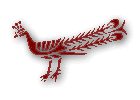 |
|
| ISSN 1084-7553 | |
| IJTS Vol. 1, No. 1 August 1995 |
|
| Editorial Note | |
| The Unique Position... | |
| 1. The Concept of... | |
| 2. The Spanda and... | |
| 3. Conclusion... | |
| Computer Space | |
| News | |
| Letters | |
| Support The IJTS |
|
|
|
|
| Search |
|
| Register |
|
| Create Your Profile | |
| Recover Password | |
| Log In |
|
| Institutional Sub |
|
| none | |
Among the Others of the Trika System of Kazmir
| by Enrica Garzilli |
|
1. The Concept of Spanda.* Among the various schools that flourished in medieval KazmIr 1, the Zivaite Agama-s developed a monistic philosophic system called Trika around the end of the 8th Century A.D. One of its features was the doctrine of spanda that, as we will see, originated a school in many ways different from the other Zivaite schools. The term spanda derives from the verb spand that means 'to throb with life', 'to vibrate'. In fact, spanda is the immovable vibration of Ziva, the vibration of the universal consciousness that is our own consciousness. The vibrating consciousness is also the reality that is the very foundation of the multiplicity and the multiformity of the world, from the lowest category 2 up to Ziva. This reality also animates and enlightens every state of our ordinary experience3. The spandakArikA-s, together with the ZivasUtra-s the basic texts of this school, were written either by Vasugupta or more probably by his disciple KallaTa. They guide the adept to grasp this vibrating reality through the ordinary experiences of everyday life. Where can one experience spanda? The spandakArikA-s say: "The cognition I am happy and unhappy and attached and others, these evidently are founded some place other than where the state of happiness etc. are strung together." 4Therefore spanda, as explained by KSemarAja, is the connecting point of various states and it is where the various states arise. The unifying moment of every feeling and state, waking, dream, deep sleep is spanda, which is also the fourth state. The ZivasUtra-s say that one who mixes the three states with the bliss of the fourth becomes the master of heros 5. The fourth state is full consciousness. The hero should meditate on the wheel of powers, namely the source of energy, Zakti who actually creates the world. [This is a preview of the full page; if you are a member of the Asiatica Association and have access to the IJTS, please login using the box on the left menu; non members: please become a member to support the Asiatica Association, and get full access to our publications.] |
|
©1995-2006 Asiatica Association. All Rights Reserved
site development L. Magnocavallo / site comments E. Garzilli |